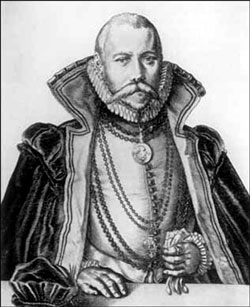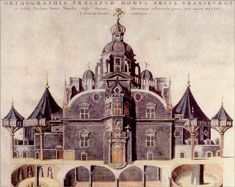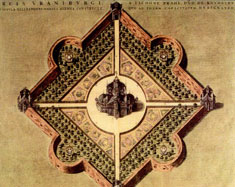The life of Tycho Brahe
On the 21st of August 1560 the then fifteen year old Tycho Brahe observed a solar eclipse and it became the decisive experience, which led him to the serious study of astronomy.
Tycho Brahe was born into a high ranking noble family on December 15, 1546. With that he was destined for a life and work with the Danish court, but his strong interest in astronomy led him in a completely different direction, which made him one of the most important Danes of all time, renowned far beyond his time and his native land.

Tycho's birthplace, Knudstrup (Swedish: Knutstorp), in Skåne.
In April 1559 he began his studies at the University of Copenhagen only 12 years old, which was very customary at that time. He was supposed to study law and he did, but he soon became interested in astronomy. A partial solar eclipse on the 21st of August 1560 made a big impression on him, especially because it had been predicted. So he began his own studies of astronomy with the help of some of his professors.
For a large part of the period 1562-70 he was on educational tours throughout Europe, where officially he was supposed to study classical language and culture. But he also studied astronomy, made astronomical measurements and constructed instruments. He also occupied himself a great deal with alchemy which today we would call chemistry, medicine and astrology, not the making of gold from other metals.
Tycho Brahe worked on the island Hven from 1576 to 1597, making observations of stars and planets with new instruments.

Tycho Brahe worked on Hven from 1576 to 1597 observing stars and planets with new instruments.
From 1599 he lived in Prague as the Imperial Mathematician.
On the 24th of October 1601 he suffered a painful death caused by mercury, which he had ingested because he thought it was good for his health. No one at that time knew about the extreme toxicity of mercury. For this reason the modern myth that he was murdered with mercury is obvious nonsense.
But intriguing myths can never be killed, including the old one that Tycho Brahe died of a ruptured bladder because he was embarrassed to leave the Emperor's table to relieve himself of all he had drunk. This cannot be the case as doctors have long said that a bladder cannot rupture in this way.
Written by astronomer dr. scient. Erik Høg, emeritus at the Niels Bohr Institute.


